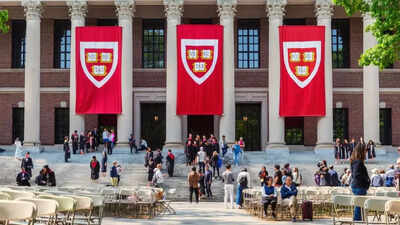
A fierce confrontation is escalating between Harvard University and the Trump administration , a battle that cuts far deeper than immigration policy. At stake is the very essence of Harvard’s role as a global academic institution.
What began as a series of bureaucratic moves has erupted into a full-fledged legal conflict, with President Donald Trump launching an aggressive campaign to dismantle Harvard’s ability to host international students. This is no mere regulatory dispute; it is a strategic attempt to undermine the university’s international character, challenge its academic independence, and reshape the landscape of elite higher education.
As federal courts step in to intervene, the conflict has morphed into a defining legal showdown, one that could set powerful precedents for how far a government can go in targeting universities through immigration law.
Homeland Security’s certification crackdown blocked for now
The Trump administration, through the Department of Homeland Security (DHS), attempted a rare and aggressive move in May, revoking Harvard’s certification under the Student and Exchange Visitor Program (SEVP), a designation required to host foreign students.
The rationale? The administration exercised its authority under SEVP, which typically applies to schools failing accreditation, lacking faculty, or operating outside educational norms.Harvard swiftly sued, accusing the administration of violating its own federal procedures. The legal response proved effective. US District Judge Allison Burroughs first issued a temporary restraining order, and on Friday, elevated it to a preliminary injunction, pausing DHS's efforts until the case is resolved.Still, the court left room for continued oversight. Burroughs emphasized the government’s authority to carry out standard administrative review processes. DHS responded by issuing a “Notice of Intent to Withdraw,” signaling that the showdown is far from over.“Today’s order does not affect the DHS’s ongoing administrative review,” Harvard clarified to students. “Harvard is fully committed to compliance with the applicable F-1 (student visa) regulations and strongly opposes any effort to withdraw the University’s certification” as reported by the Associated Press.
Trump blocks entry for Harvard students, Harvard hits back
Escalating the confrontation, Trump personally issued a presidential proclamation earlier this month that barred new Harvard international students from entering the United States, this time invoking sweeping executive powers that allow the president to restrict classes of foreign nationals.Harvard’s legal team argued the move was legally baseless. The proclamation, they contended, misused the phrase “class of aliens,” targeting individuals solely based on their academic destination rather than any real security threat.Judge Burroughs once again stepped in, temporarily suspending the entry ban. A ruling on Harvard’s request for a longer-term injunction is still pending.“We expect the judge to issue a more enduring decision in the coming days,” Harvard said in a message to international students as reported by the Associated Press.At the heart of Trump’s directive was an accusation that Harvard had failed to properly address antisemitism on campus, particularly during pro-Palestinian demonstrations.
Trump argued that the university was no longer a “suitable destination” for foreign scholars. Harvard President Alan Garber responded that the university had enacted reforms to combat antisemitism but would not yield to politically driven pressure.
State Department tightens visa reviews, expands scrutiny nationwide
Secretary of State Marco Rubio intensified the campaign by ordering US consulates to begin scrutinizing the social media accounts of visa applicants affiliated with Harvard.
Just days later, the State Department broadened the effort nationwide. Consular officials were instructed to evaluate foreign students’ online presence for posts deemed hostile to the US government, institutions, or foundational values.New instructions also urged visa officers to prioritize applications to universities with fewer than 15% international students, a demographic threshold Harvard and nearly 200 other US institutions surpass.
All eight Ivy League schools fall into this category.Applicants have also been told to make their social media accounts public, a move critics argue undermines privacy rights and academic openness.
Global fabric of Harvard under threat
Harvard’s reliance on international students runs deep. More than 7,000 individuals are currently sponsored on F-1 and J-1 visas. About 26% of the overall student body comes from abroad, but the percentage climbs sharply in certain schools and programmes.
- Harvard Kennedy School: 49% international students
- Harvard Business School: 33% from overseas
- Harvard Law School’s LL.M. programme: 94% international students
These numbers reflect Harvard’s global reach and illustrate the magnitude of what’s at stake.
Political retaliation or legitimate policy?
The administration’s assault comes in the broader context of Harvard rejecting federal demands concerning campus protests, admissions, and faculty hiring. While conservative voices argue the federal actions are justified responses to institutional bias and antisemitism, Harvard claims retaliation.The university insists its compliance with immigration and academic regulations is above board, and that the federal government is abusing its power.“Harvard is fully committed to compliance,” the university reiterated, pushing back against accusations of wrongdoing and asserting its right to academic independence.
Legal precedents in the making
Judge Burroughs’ recent injunction buys time, but a definitive legal judgment is still on the horizon. The broader constitutional questions, whether presidential powers extend to targeted academic suppression, and whether immigration tools can be weaponized against ideological opponents, are yet to be settled.
This legal drama may ultimately set new benchmarks for academic freedom, immigration policy, and the limits of executive authority. For now, Harvard’s international students remain suspended in uncertainty, caught in a courtroom war that will likely echo through American higher education for years to come.

 5 hours ago
51
5 hours ago
51




























 English (US)
English (US)